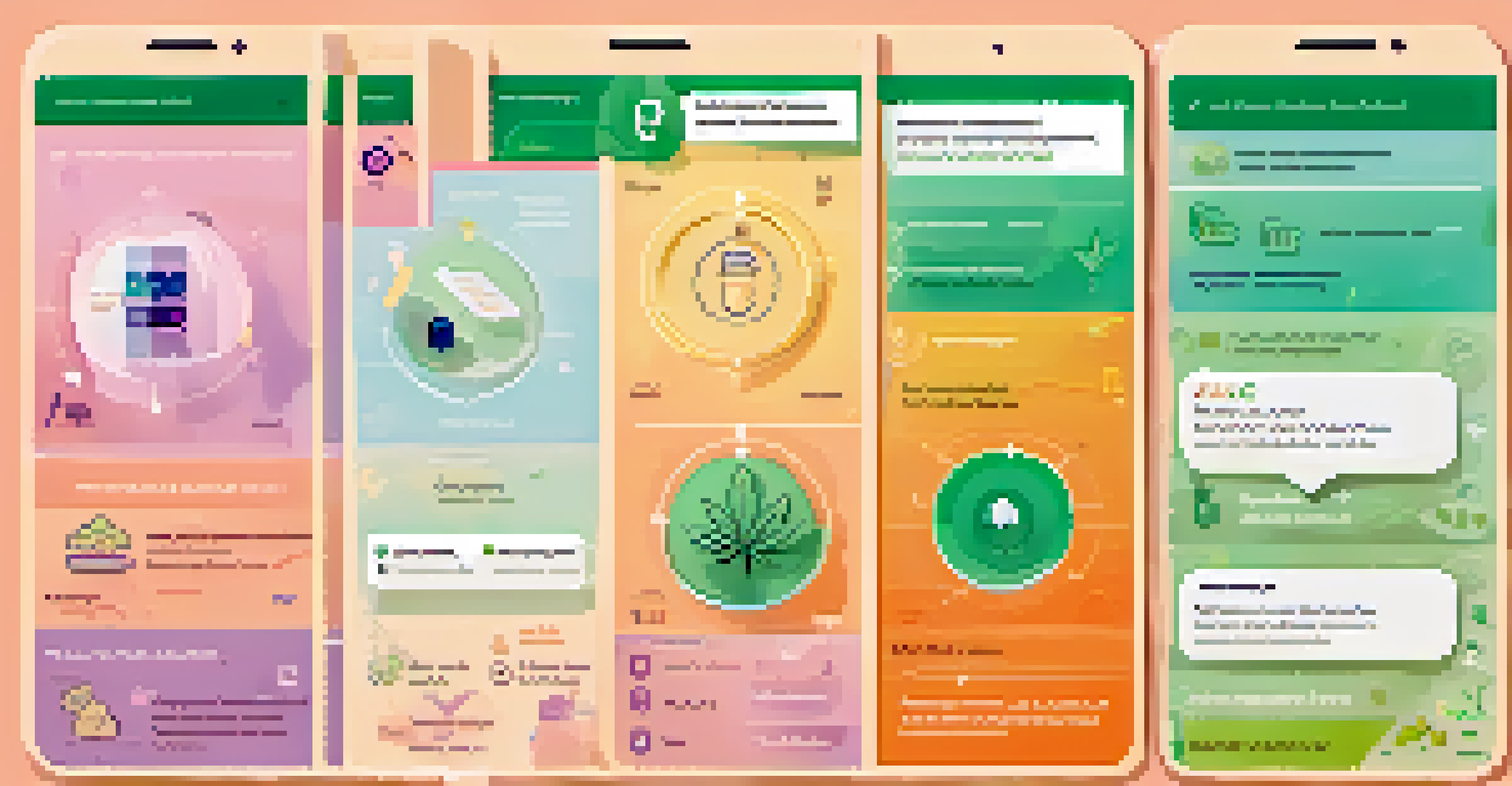Integrating Digital Health Apps in Marijuana Consumption Therapy

Understanding Marijuana Consumption Therapy
Marijuana consumption therapy involves using cannabis to manage various health conditions. This approach can help alleviate symptoms related to pain, anxiety, and other chronic illnesses. As more people turn to marijuana for relief, understanding its therapeutic potential becomes vital.
The greatest wealth is health.
Patients often seek alternatives to traditional pharmaceuticals, leading to increased interest in cannabis-based treatments. However, navigating the world of marijuana can be overwhelming due to varying strains and methods of consumption. This is where digital health apps come into play, offering guidance and support.
These apps can serve as a bridge between patients and their healthcare providers, ensuring a more tailored approach to therapy. By integrating technology into treatment plans, users can track their consumption and its effects, making adjustments as needed for optimal results.
The Role of Digital Health Apps in Therapy
Digital health apps act as powerful tools that can enhance the experience of marijuana therapy. They provide users with valuable resources, such as dosage calculators, strain information, and symptom trackers. This information empowers patients to make informed choices about their therapy.

With features like reminders for doses and educational content, these apps can help users adhere to their treatment plans. They foster a sense of accountability and encourage patients to stay engaged with their health. Additionally, they can facilitate discussions with healthcare providers by offering insights into a user's experience.
Digital Health Apps Enhance Therapy
These apps provide tools for tracking consumption, managing symptoms, and fostering patient-provider communication.
Moreover, many apps include community forums where users can share experiences and tips. This peer support can be incredibly beneficial, providing encouragement and motivation throughout the therapeutic journey.
Key Features of Effective Health Apps
An effective health app should prioritize user-friendly design and accessibility. Intuitive navigation ensures that patients can easily find the information they need without frustration. Additionally, a clean layout can enhance the overall user experience, making it more enjoyable to use the app regularly.
The best way to predict the future is to create it.
Another crucial feature is comprehensive data tracking, allowing patients to log their consumption and symptoms over time. This data can be invaluable for identifying patterns and understanding what works best for them. The ability to visualize this information can also motivate users to stay committed to their therapy.
Lastly, integration with telehealth services can be a game-changer. By enabling virtual consultations with healthcare providers, users can receive expert guidance without the need for in-person visits, making therapy more accessible and convenient.
Personalization and Customization in Therapy Apps
Personalization is a key aspect of successful marijuana therapy, and digital health apps can offer tailored experiences. By allowing users to customize their profiles, apps can deliver relevant content and recommendations. This ensures that the app meets each user's unique needs and preferences.
For instance, users might input their specific health conditions, preferred strains, and previous experiences. Based on this information, the app can suggest appropriate dosages and consumption methods. This level of customization not only enhances user satisfaction but also improves therapy effectiveness.
Personalization Improves User Experience
Customizable features in apps allow for tailored recommendations, enhancing therapy effectiveness for individual users.
Furthermore, personalized notifications can remind users to check in with their symptoms or try new strains. This ongoing engagement helps maintain focus on their health goals and encourages consistent use of the app.
Ensuring Data Privacy and Security
As with any health-related application, data privacy and security are paramount. Users must feel confident that their personal information is protected when using digital health apps. Developers need to implement robust security measures to safeguard sensitive data.
Transparency is also essential; apps should clearly outline how user data is collected, stored, and used. Providing users with control over their information can build trust and encourage widespread adoption of these tools. This includes options to share data with healthcare providers when desired.
In addition, compliance with regulations, such as HIPAA in the United States, is vital for apps handling health-related information. Ensuring adherence to these standards not only protects users but also enhances the app's credibility in the healthcare landscape.
Challenges in Integrating Digital Health Apps
While the potential of digital health apps in marijuana therapy is vast, several challenges exist. One major hurdle is the varying legality of marijuana across different regions. Developers must navigate complex regulations to create apps that comply with local laws without alienating potential users.
Another challenge is ensuring the accuracy of information provided by the app. Misinformation can lead to negative health outcomes, making it crucial for developers to collaborate with healthcare professionals. Regular updates and evidence-based content can help maintain the app's reliability.
Data Privacy is Crucial in Apps
Ensuring robust security measures and transparency builds user trust and encourages the adoption of health-related applications.
Lastly, user engagement can be a struggle. Some individuals may find it difficult to consistently track their consumption or may lose interest in using the app. Incorporating gamification elements, such as rewards for regular use, can help keep users motivated and engaged.
The Future of Digital Health in Marijuana Therapy
Looking ahead, the integration of digital health apps in marijuana consumption therapy is likely to grow. As technology continues to advance, these apps will become more sophisticated, offering enhanced features and functionalities. This evolution will further empower patients to take charge of their health.
The increasing acceptance of marijuana as a therapeutic option will also create more opportunities for app development. As more research emerges, apps can adapt to incorporate new findings, ensuring users receive the best possible guidance. This will lead to a more informed patient population and improved health outcomes.

Ultimately, the marriage of technology and marijuana therapy holds great promise. By harnessing the power of digital health apps, patients can optimize their therapeutic journeys, paving the way for a healthier future.